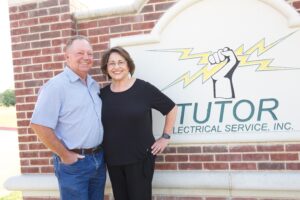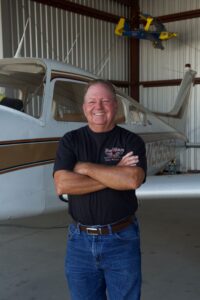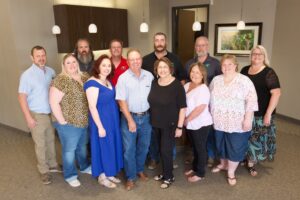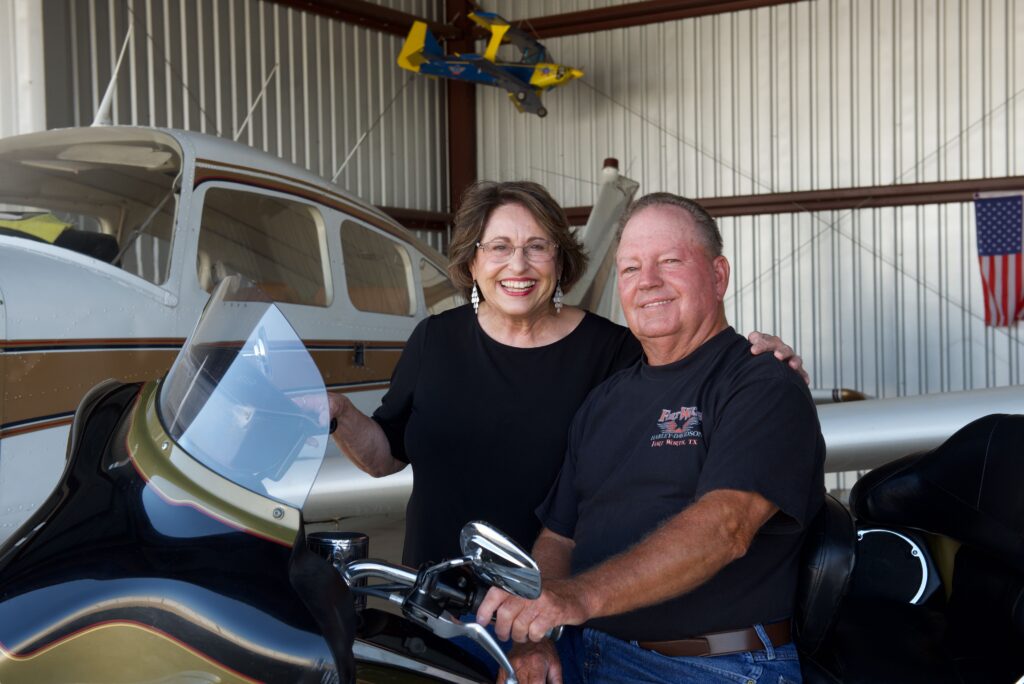Tutor Electric of Mansfield, TX, is by all measures a successful business. Growing from one to 50 employees over 30 years while surviving the economic downturns of 2001 and 2008 is a great achievement. But successful businesses are only representations of exceptional people. This story follows the development of Bobby Tutor, the growth of Tutor Electric, and a philosophy for running a great business.
 Bobby Tutor grew up in “Texas hill country.” The son of a homebuilder, he started swinging a hammer at age 12 and learned the virtues of hard work. After graduating from high school, he headed off to Stephen F. Austin State University to study forestry. It was there, walking across campus one afternoon, that Bobby discovered his thirst for adventure.
Bobby Tutor grew up in “Texas hill country.” The son of a homebuilder, he started swinging a hammer at age 12 and learned the virtues of hard work. After graduating from high school, he headed off to Stephen F. Austin State University to study forestry. It was there, walking across campus one afternoon, that Bobby discovered his thirst for adventure.
He spotted a skydiving sticker pasted on the window of a Volkswagen Beetle. Bobby approached the driver and asked what it was all about. His classmate was starting a skydiving club at the university. “Interested in joining?” he asked. Bobby had never jumped from a plane. In fact, he had never flown in a plane. “Sounds great!” he replied. Bobby made over 30 jumps with the Stephen F. Austin State University skydiving club, and he developed strong friendships with his fellow daredevils. One of those friends, Larry Heckler, would become a regular character in Bobby’s life story. While still in college, the two friends founded B&L Home Improvement to earn extra cash for their skydiving habit. One day, while working on a project together, Larry suggested a “crazy idea.” “Bobby, we should join the Navy together.”
In 1977, to boost recruitment numbers, the Navy developed a “buddy plan,” where one could sign up and serve with a friend. Bobby agreed to enlist with Larry. Unfortunately, for reasons Bobby doesn’t know, the Navy rejected Larry’s application. Bobby found himself in basic training and later assigned to the Naval Dental Corps—without his friend. His assignment was about as far from Texas as possible: the Brunswick, ME, Naval Air Station.
Bobby was in a completely foreign environment. Serving with eight dentists and over a dozen fellow technicians, he adjusted to a new disciplined daily routine and the less disciplined Maine weather. Where the skydiving club was a loose-knit group of adolescents seeking thrills, this new assignment was with a group of mission-driven individuals. During his stint in the Navy, Bobby became an adult. Three years later, he was honorably discharged and prepared to move home to Texas when he received a call from an old friend. It was Larry.
 From Carpenter to Electrician
From Carpenter to Electrician
Larry’s employer, Phillips Electric, needed a carpenter, and Bobby’s early days working in his father’s construction business qualified him for the job. There were several Woolco stores that each required a new suite of cash registers. For the next six months, Bobby traveled around Texas, Arkansas, and New Mexico spending nights locked in Woolco locations where he focused on “doing the job right.” He also developed an appreciation for the electrical trade. When his contract ended, Bobby approached Phillips Electric President Dan Phillips and asked if he could stay on as an apprentice.
Transitioning from carpentry to electrical work, Bobby hit the fast track. “It’s not rocket science, it’s a matter of doing the right thing, working as hard as you can, and learning from your mistakes,” he says. Bobby spent his next years mastering the trade at Phillips Electric and a later spin off, Dav-Kin Electric, working hard and perpetually learning as a journeyman electrician.
It was at a party at his friend Larry’s house that Bobby met Diana Pierce. A year later, they married. Bobby began thinking about his future. His introduction to the trades through his father’s business, the discipline he acquired during his stint with the Navy, his mastery of electrical work gained through his apprenticeship with Phillips Electric—these experiences would culminate into a fulfilling career. But what about Bobby’s thirst for adventure? Where was the risk? Something was missing in Bobby’s life.
The Start of Tutor Electric
In January 1993, Bobby sat down with Diana and explained his desire to start his own business. He thought his acquired skills and discipline, combined with his faith and comfort for taking risks, prepared him to go out on his own. With Diana’s blessing, Bobby “jumped from the plane,” so to speak, leaving the comfort of gainful employment behind.
In his red and tan GMC pickup truck with the words “more power to you” painted on the side, Bobby went looking for his first customers. His faith helped—quite literally, in fact. He placed an advertisement in his local church bulletin, Shepards Guide. The first projects were small, but like previous jobs, Bobby focused on doing the work right, on time, and within budget. Referrals flooded in, and Diana was able to join him full time. But Bobby was looking for a bigger adventure, or in this case, a bigger company.
Transitioning From Self-Employed to Employer
Military service teaches discipline through a rigid organizational structure. Ranks with progressive levels of responsibility form the framework of the military. In some ways, it’s much like an apprenticeship program. Bobby realized that growth required more labor than he could provide with his own two hands, but the growth Tutor Electric had experienced was due to his creed of doing “his best possible work.” As Bobby learned, growing a business beyond the value of one’s own labor is challenging.
growing a business beyond the value of one’s own labor is challenging.
Bobby met his first potential apprentice through a colleague. “I know a young fellow who’s graduating from high school. Could you talk to him?” And with that conversation, Bobby transitioned from doing it the “Tutor way” to teaching the Tutor way. He trained his helper and later sponsored his IEC education. Growing great employees became Bobby’s passion and a key ingredient to Tutor Electric’s success.
Bobby learned that, on average, he needed five helpers to find one good apprentice. “Not everyone is cut out to become an electrician,” he says. “Everyone has value, but some need to figure out where that value lies. It’s not always as an electrician.” Over time, Bobby placed over two dozen apprentices into the IEC program and built a loyal workforce of journeyman electricians schooled in the “Tutor way” of doing things. It didn’t take long for IEC to recognize Bobby’s eye for spotting talent. He received a call from a local IEC board member who convinced Bobby to join the IEC Fort Worth/Tarrant County board of directors.
Once a Tutor, Always a Tutor
Bobby continued his service in IEC over the next 25 years, eventually serving as the president of the state, and later the national, board of directors (2012). It was while serving in the national role that Bobby met Joe Hovanec, president of Advanced Electric Design and Service. Joe remembers being welcomed at his first IEC meeting. “When I first got involved in National IEC as a regional director, I was at a conference in Arizona. My wife and I were sitting at a table in the hotel’s courtyard eating the continental breakfast. We didn’t know anyone on the national side, and then Bobby introduced himself and asked to sit down with us. We’ve been friends ever since.”
Bobby worked with Joe and eventually helped him transition into the role of IEC National president. “He played a big role in my development and was the person I turned to when I needed advice,” Joe says. “I even recognized him as a mentor in my president’s address in San Antonio.” Yes, Bobby’s knack for finding talent included replacing himself as IEC’s leader.
Tutor Electrical Service is approaching its 30th birthday, and looking back, Bobby’s theory that “growing a great business is about growing great
people” stands the test of time. The Tutor way extends far beyond doing great electrical work in the field. It’s a philosophy of finding the good in people, taking the time to teach them, and celebrating their successes. “Every job that we do is important, and so is how we treat people,” he says. The Tutor way has served Bobby Tutor, his employees and colleagues, and Tutor Electrical Service quite well.
Photos by Brett Dougall


